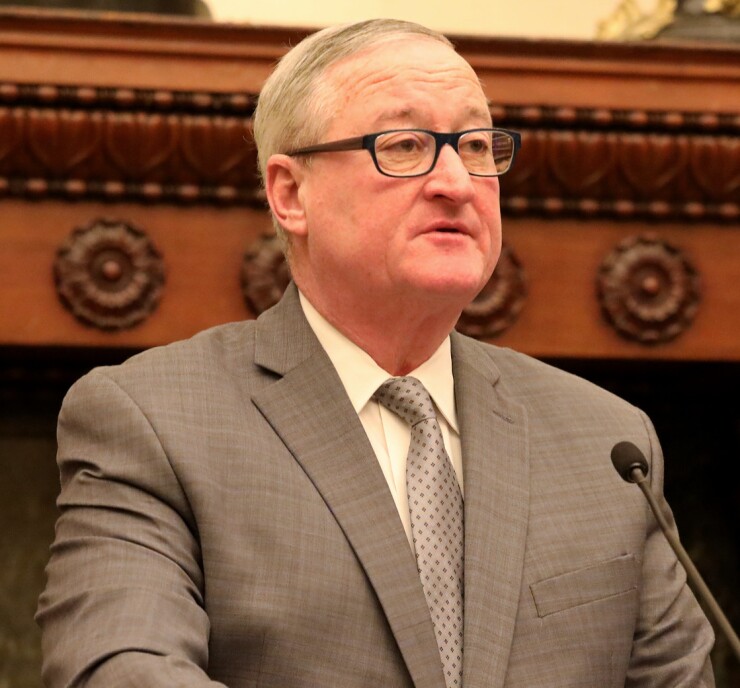Philadelphia's revised revenue projections show a deeper budget hole for the coming fiscal year, just two weeks before the June 30 budget deadline.
Mayor Jim Kenney’s administration is now forecasting the COVID-19 pandemic will result in a $749 million budget gap for the 2021 fiscal year that commences July 1, marking a $100 million increase from late April forecasts. City Budget Director Marisa Waxman said the revision is driven largely by worse-than-expected dips in the city’s realty transfer and sales taxes, stemming from the virus-related economic shutdown.

Kenney released an
“Philadelphia has a big revenue challenge right now, but that is not that different from other cities in the country,” said Fitch Ratings analyst Eric Kim. “The economic dislocation is significant in its scope and speed.”
Despite lower reserve levels in the next year, Philadelphia will not likely be at risk for a credit downgrade.
“We’re doing our best to look beyond this downturn to see where cities are going to be positioned after the economic recovery,” Kim said. “Right now, in this environment, we expect governments to be doing very unusual things and unprecedented things with managing their budgets.”
Fitch rates Philadelphia general obligation bonds A-minus with a positive outlook. The city is rated A by S&P Global Ratings and A2 by Moody’s Investors Service with stable outlooks.
The updated estimates wiped out a previously projected $87 million fund balance. Kenney had proposed a $318 million surplus goal in his initial budget proposal in March, which would have comprised about 6% of planned spending. The city is still determining its 2021 fund balance target, according to Waxman.
Jim Engler, Kenney’s chief of staff, said the administration will be working with the City Council on how to best confront the revenue gaps either through spending cuts or new taxes. City officials didn’t reveal plans for possible spending reductions during a media briefing Monday, but said the administration is proposing scrapping a planned $19 million increase to the Philadelphia Police Department.
Finance Director Robert Dubow said the Kenney administration still wants to raise the wage tax for non-residents and parking taxes, which would net the city around $34 million. Kenney abandoned a plan to hike property taxes 3.95% after Pennsylvania lawmakers approved a
Waxman said the city hopes to receive additional federal funding, but noted funding from the CARES Act can only be used for COVID-19-related spending. She stressed the city can’t bank on federal aid to combat budget woes, since that would require regulations to be changed.
“You can’t build budgets on hope, so we had to go with the real fiscal reality," Waxman said.
Villanova University School of Business Professor David Fiorenza said the Kenney administration will have a difficult time cutting the previously planned police budget increase since the city’s is contractually obligated to fund certain line items, like salaries and benefits. He said the city faces near-term revenue challenges from lost tourism dollars and economic activity surrounding sporting events.
“The city will lose revenues from cancellations of conventions and conferences, summer tourism and professional sports teams seasons that were stalled, abbreviated, and starting later than usual,” Fiorenza said. “I would not bank on federal aid, although Philadelphia is in a better position than other cities that were running a deficit before COVID-19.”





